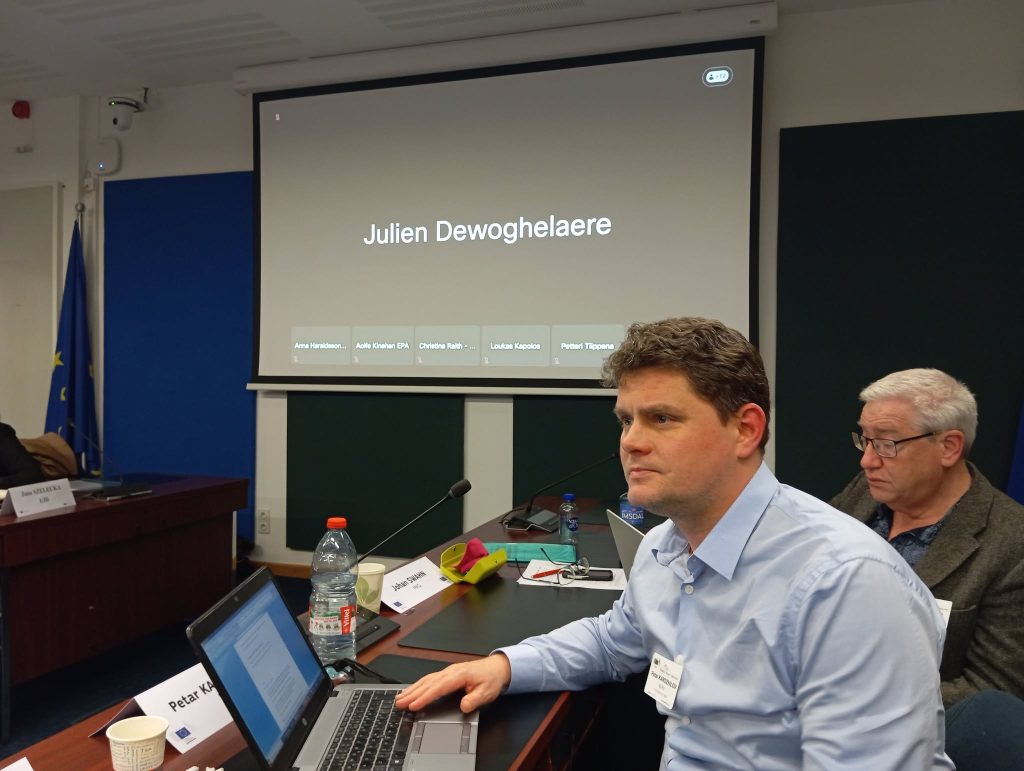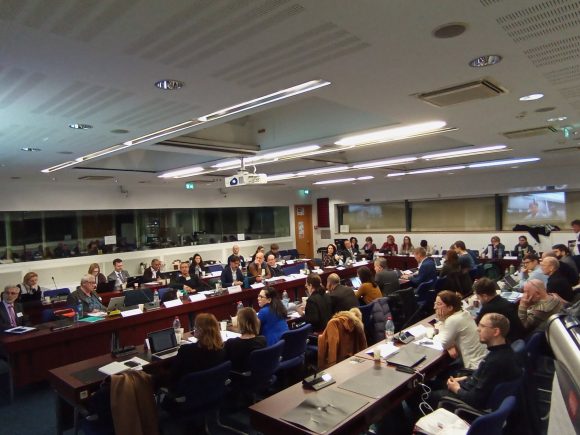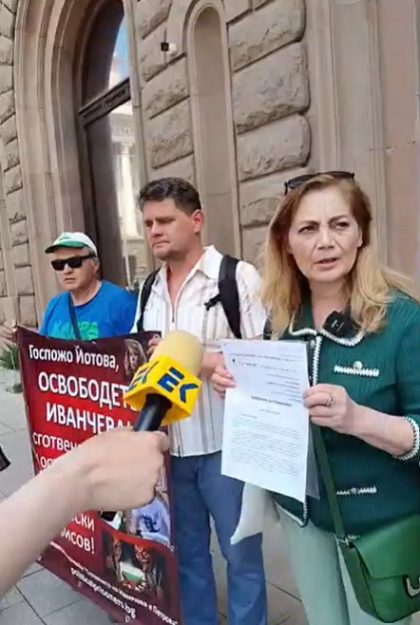
Dr. Petar Kardzhilov at the event held in Luxembourg
.
AND SYSTEMATICALLY VIOLATES THE AARHUS CONVENTION
.
Dr. Petar Kardzhilov is a specialist in risk and crisis communication, member of the board of Nuclear Transparency Watch and of the Union of Scientists in Bulgaria, complainant in six court cases concerning transparency, safety and public participation in nuclear
.

.
On 21 and 22 January, a roundtable discussion was held in Luxembourg on the topic: The Aarhus Convention and Nuclear Energy: “Implementation of the Nuclear Safety Directive: Transparency, Public Participation and the Role of Civil Society in the Independent Regulation of Nuclear Energy”. The event was organized by the international NGO for transparency in nuclear energy, Nuclear Transparency Watch (NTW) and the European Commission’s DG Energy, in coordination with the European Nuclear Safety Regulators Group (ENSREG), the National Association of Local Information Committees and Commissions (ANCCLI, France) and the European Environmental Bureau (EEB).
We brought together active citizen experts, representatives of nuclear regulators from several Member States and lawyers from the Aarhus Convention Compliance Committee. We discussed on two main topics: 1) Nuclear regulators as facilitating bodies for access to public participation – Art. 3(2) of the Aarhus Convention (AC) and Art. 8(4) of the Nuclear Safety Directive (NSD), and 2) Nuclear regulators and licensees as facilitating bodies for access to information – Art. 3(2) of the AC and Art. 8(1) of the NSD.
Convention on Access to Information, Public Participation in Decision-Making and Access to Justice in Environmental Matters (Aarhus Convention), Aarhus, Denmark, 25 June 1998, ratified and in force for Bulgaria since 16 March 2004.
Article 3, paragraph 2
“Each Party shall endeavour to ensure that officials and authorities assist and provide guidance to the public in seeking access to information, in facilitating participation in decision-making and in seeking access to justice in environmental matters.”
Council Directive 2009/71/Euratom establishing a Community framework for the nuclear safety of nuclear installations, amended by Council Directive 2014/87/Euratom of 8 July 2014 (Nuclear Safety Directive, according to which it is desirable for Member States to adapt their national legislation) Article 8 Transparency, paragraph 1
“Member States shall ensure that necessary information in relation to the nuclear safety of nuclear installations and its regulation is made available to workers and the general public, with specific consideration to local authorities, population and stakeholders in the vicinity of a nuclear installation. That obligation includes ensuring that the competent regulatory authority and the licence holders, within their fields of responsibility, provide in the framework of their communication policy:
(a) information on normal operating conditions of nuclear installations to workers and the general public; and
(b) prompt information in case of incidents and accidents to workers and the general public and to the competent regulatory authorities of other Member States in the vicinity of a nuclear installation.”
Article 8 Transparency, paragraph 4
“Member States shall ensure that the general public is given the appropriate opportunities to participate effectively in the decision-making process relating to the licensing of nuclear installations, in accordance with relevant legislation and international instruments.”
Below, I present four current cases from my personal practice as activist, journalist, communications specialist, and expert at NTW, in which Bulgarian institutions violate the AC and completely ignore the NSD, including the national legislation, part of which are the Safe Use of Nuclear Energy Act (SUNEA) and the Environmental Protection Act (EPA).
.
Case 1: Decision of the Council of Ministers to build two new units at Kozloduy NPP
– ignoring the requirement of for public participation
On October 25, 2023, following a binding decision of the National Parliament (NP) earlier the same year the Council of Ministers (CM) of the Republic of Bulgaria took a decision assigning the Minister of Energy (ME) to organize the necessary procedures for the selection of a contractor providing the comprehensive services for the design, construction and commissioning of Unit 7 of the Kozloduy NPP with Westinghouse AP-1000 technology. We found the information about the decision in a transcript of the CM meeting of the same date, but the decision itself as a separate document (as required by law) does not exist neither on the CM website nor on the website of the ME. One of the sub-points in the decision even defines a specific transformation and financing: “The Minister of Energy shall take action to transform “Kozloduy NPP – New Capacities” EAD into a joint-stock company with the “Bulgarian Energy Holding” EAD acquiring a majority stake in the company by increasing its capital with a cash contribution of up to 500 million levs”. Regarding the future Unit 8 at Kozloduy NPP, the Council of Ministers invents and accepts a new concept of a “decision in principle”, different from a “decision in substance” which is in force for Unit 7 – such concepts do not exist at all in the national Safe Use of Nuclear Energy Act (SUNEA)!
In addition to violating Art. 3(2) of the AC, as well as Art. 8(4) of the NDA, this CM’s decision also violates Art. 45, par. 2 and 4 of of SUNEA as the procedures have not been followed – to prepare official reports concerning: “nuclear safety and radiation protection; environmental impact and physical protection; the socio-economic importance of the construction of a nuclear power plant for the country or for individual regions; radioactive waste and spent nuclear fuel resulting from the operation of a nuclear power plant, and their management”(par. 2), as well as the organization of public discussion on the intention, when all of the listed reports are available and reviewed by citizens (par. 4). For this reasons, at the end of November 2023, Eng. Petar Penchev and I, again with pro bono legal support of lawyer Alexander Kashumov, filed an appeal with the Supreme Administrative Court (SAC) against the CM’s decision.
In response to our appeal, on 05.02.2024, two Bulgarian MPs submitted to the NP a draft amendment to Article 45 of SUNEA, which draft was voted by the NP, so that our appeal and the court hearing would not interfere with the procedures for the construction of units 7 and 8, inserted in the meeting minutes of the CM.
In this case, it is also important to know the following facts: the decision on the EIA for Unit 7 was adopted on 27.01.2015. Together with Eng. Petar Penchev, we appealed this decision due to numerous flaws in the EIA, but we lost the case at the last instance, with the court ruling on 02.04.2019. This means that the legal effect of the EIA for Unit 7, according to Bulgarian law, has expired five years after the final court decision – on 02.04.2024. Since construction of the unit has not begun during these five years, a new EIA should be prepared and adopted. However, Bulgarian institutions claim the opposite. In May 2024, Todor Todorov, energy coordinator at the Ecological Association “For the Earth” asked the Minister of Environment and Water whether construction had begun on the site. The Minister replied that in 2023 representatives of the Regional Environmental Inspectorate – Vratsa established on site that construction activities had begun, therefore the legal effect of the EIA for Unit 7 is in force. In our opinion, these statements by the institutions about the start of construction on the site do not correspond to the truth because it was only in November 2024 that a contract was signed with the Westinghouse–HD&C consortium for the preparation of an engineering project to determine the price of units 7 and 8. How is it possible that you started building without knowing the price, without having a technical and working project, as required by law?
Development of Case 1 in recent months – late 2024 and 2025
The court hearing on our appeal against the decision of the CM was held on 21.10.2024, and we are still waiting for the court’s decision. Meanwhile, on 04.11.2024, representatives of Kozloduy NPP – New Power, Westinghouse and Hyundai signed a contract for the construction of two new units of Kozloduy NPP. The goal is to have an engineering project for the construction of the two new units of Kozloduy NPP ready within a year and to make their price known. The ME announced that this engineering project will cost between $350 and $370 million, and the currently estimated price is $14 billion for the two units.
On December 13, 2024, the media reported even more exotic information that agreements for financial assistance from the US Trade and Development Agency were signed with the Bulgarian Energy Holding (BEH) and the State Enterprise „Radioactive Waste“ (SE RAW). Based on this cooperation, studies will be supported for the construction of small modular reactors in Bulgaria and for finding a site for underground storage of spent nuclear fuel. BEH will receive 2.177 million levs free of charge for conducting studies for the installation of various models of small modular reactors, and the analyses must be ready within 12 months. They must determine the most suitable locations for the installation of these more maneuverable nuclear capacities.
In an interview with Eurocom TV on January 24, the former chairman of the Bulgarian nuclear regulator (1997-2001) Prof. Georgi Kaschiev explained that the price of $14 billion for the two units, which is being speculated, is hardly possible, given that Westinghouse’s project for the first nuclear power plant in Poland, which envisages three reactors of the same AP1000 model, is worth 45 billion euros. For Prof. Kaschiev, the contract with the Westinghouse-HD&C consortium is a burial for Bulgaria, as according to him it will absorb huge sums, without clarity on whether new nuclear units will be built, given Westinghouse’s unfortunate practice in the USA. On 28.01, the chairman of the National Parliament associate professor Natalia Kiselova personally visited the Kozloduy NPP and stated: “The projects for a second nuclear power plant (i.e. Belene NPP – note by P.K.) or units 7 and 8 of the Kozloduy NPP are key to the energy security and stability of the national electricity system.” Is Ms. Kiselova, as a well-known constitutionalist, aware that the decision for units 7 and 8 was made in violation of the SUNEA?
Case 2: Strategy (national program) for the management of spent nuclear fuel and radioactive waste of the Republic of Bulgaria – ignoring the requirement for public participation
(This case indirectly concerns Art. 8(4) of NSD, because the strategy (“national program” under Directive 2011/70/Euratom on spent fuel and radioactive waste) includes a plan for the construction of a deep geological repository, as well as the management of the interim storage of spent fuel at the Kozloduy NPP site, since Art. 3(2), a) of the NSD includes also a “spent fuel storage facility” under the definition of “nuclear installation”.) Case 2 also represents a direct violation of Art. 7 of the AC, as well as Art. 74, para. 2 of SUNEA.)
In the summer of 2014, engineer-mathematician Petar Penchev, deputy chairman of the NGO „Ekoglasnost“, with the pro bono assistance of lawyer Alexander Kashumov, appealed to the SAC a decision of the CM from 25.6.2014, which annulled item V.2.4 „Assessment of the level of RW sustainability“ and Appendix No. 6 „Review of the recommended final stages for the management of specific RW flows“ of the Strategy for the Management of SNF and RW until 2030. They justify their legal interest in challenging the act with Art. 74, para. 2 of the SUNEA, according to which civil organizations and individuals have the right to participate in the discussion of the draft strategy, but such a discussion was not publicly announced and held. This text corresponds to Art. 3(2) and Art. 7 of the AC, but nevertheless the SAC determined that the appellant had no legal interest because the strategy as a document “does not create rules of conduct or regulation, therefore it does not directly affect the rights and legitimate interests of citizens or organizations”. On 30.04.2015 the court dismissed the appeal as inadmissible and closed the case.
On 17.05.2017, the EC sent an official letter to the Minister of Foreign Affairs of Bulgaria (ref. N SG(2018)D/8096; C(2018)2904), informing Bulgaria that, after having sent its national strategy for RW management to the EC on 16 September 2015, the Commission assessed that the country had not complied with Art. 9, Art. 12, par. 1, b), Art. 12, par. 1, c), Art. 12, par. 1, d), Art. 12, par. 1, g), Art. 12, par. 1, h), Art. 12, par. 1, i) of Council Directive 2011/70/Euratom on the responsible and safe management of SNF and RW. The letter explicitly emphasizes that Bulgaria’s strategy „does not pay sufficient attention to some obligations until 2030, and activities after 2030 are generally not reflected in the program“ (Art. 12, par. 1, b) and d) of the directive). (!) This is precisely one of the two texts repealed by the CM, the repeal of which was appealed in the summer of 2014 by Eng. Penchev – Appendix No. 6 „Review of the recommended final stages for the management of specific RW streams“.
The other text repealed by the CM– “Assessment of the level of resistance of radioactive waste”, the repeal of which Eng. Penchev appealed, but the court did not uphold his appeal, also falls within the scope of the criticisms from the EC letter regarding Bulgaria’s failure to implement the Directive. This is Art. 12, par. 1, c) of the Directive, according to which the national program includes “a report on the total quantity of SNF and RW and forecasts for future quantities, including those for decommissioning, which clearly indicates the location and quantity of RW and SNF in accordance with an appropriate classification of RW”.
Bulgaria’s response to this letter is unsatisfactory with all the EC’s remarks, and therefore on 2.07.2020 the EC sent Bulgaria a Reasoned Position pursuant to Article 258 of the Treaty on the Functioning of the EU in relation to the non-adoption of the national program that complies with the Directive. The Commission officially cites its departmental letter of 17.05.2018, again copying all the remarks from the previous letter and concluding that “the Republic of Bulgaria has not fulfilled its obligations under the abovementioned Directive”.
This case shows that the Bulgarian authorities are violating not only Directive 2011/70/Euratom, but also the NSD, the AC, as well as its own national legislation – Art. 74, para. 2 of the SUNEA.
Development of Case 2 over the last 12 months
It was not until January 2024 that the ME prepared a Draft for an updated strategy for the management of SNF and RW in Bulgaria – a national program in compliance (the „compliance“ is again disputed by us through an appeal to the court) with Directive 2011/70/Euratom. The provisions of the SUNEA and the AC have again not been complied with. Public organizations and individuals have not been invited to discuss the draft of the updated strategy.
On 27.06.2024, the Ministry of Environment and Water (MEW) issued an Opinion on the environmental assessment of the draft strategy, which is currently being appealed by Eng. Petar Penchev and by me, Dr. Petar Kardzhilov, due to numerous omissions in the text of the ME draft, which are not commented on in the MEW Opinion. In the second half of 2024, the case against the MEW Opinion on the merits was transferred three times due to a dispute over the jurisdiction between the SAC and the Administrative Court of Sofia (ACS), currently is returned to ACS and has not been scheduled yet! Meanwhile, on 20.12.2024, Eng. Penchev won the case requested by the Minister of Energy for preliminary implementation of the MEW’s Opinion, which means that the new regular CM cannot adopt the draft of the updated strategy before the case on the merits for the MEW’s environmental assessment Opinion on the draft strategy has been completed. The case for preliminary implementation was decided by upholding the complaint – that the Opinion of the MEW is blatant and does not clarify the radioactive impact on people’s health and lives.
On 13.12.2024, information appeared in the media that agreements for financial assistance from the US Trade and Development Agency were signed with BEH and the State Enterprise Radioactive Waste (SERW). Based on this cooperation, studies for the construction of small modular reactors in Bulgaria and for finding a site for underground storage of SNF will be supported. According to the agreement, SERW is provided with 2.230 million levs to conduct analyses of whether there are suitable geological structures in our country for the construction of an underground storage facility for the storage of SNF. (The media in Bulgaria rarely use the correct term „deep geological repository” (DGR) because there is no one to teach them…; also because it is more convenient for the politicians to use distorted and confused terms, so „underground storage facility“ can mean whatever they wish according to the case, for example „deep borehole disposal“.) And this became big news in the Bulgarian media, given that in the project appealed by us, a whole page is dedicated to the fact that (!) analysis of geological structures suitable for SNF storage has already been carried out: „Five promising areas have been localized. An analysis of the geological-tectonic, geomorphological, neotectonic, seismic, hydrogeological and engineering-geological conditions, hydrological-climatic and socio-economic features has been carried out on each of the prospective areas – “Lower Cretaceous marls – Shumer Formation”, “Neogene clays”, “Lower Cretaceous marls – Trambesh Formation”, “Lower Cretaceous marls – Gornooryahovo Formation” and “Sakar”.” (Draft of Updated Strategy for SNF and RW…, p. 33)
Separately, in this same news, the former ME informed us that the Californian company Deep Isolation US LLC “will implement and cover part of the costs of studying the sites for the storage of RW, which will focus on the innovative deep drilling technology”. Those who know that the “deep borehole disposal” (DBD) technology, which Deep Isolation has not yet applied anywhere, is not innovative at all. The idea for it dates back to 1970 and was initiated by Sandia National Labs in the USA in 2014. The first experimental burial using this technology was carried out after citizen protests in four states – North Dakota, South Dakota, New Mexico and Texas. In the spring of 2017, the US Department of Energy terminated the program.
Is there even one politician or senior official in Bulgarian institution who can competently and honestly speak about radioactive waste management in the context of existing and planned new nuclear power plants? The question is deeply rhetorical. If such a person does exist, we are ready to meet him/her in a public discussion.
Case 3: Use of Belene NPP reactors for new units 7 and 8 at Kozloduy NPP
– concealment of information
On January 20, 2021, the Minister of Energy Temenuzhka Petkova, together with the leader of the GERB Party and Prime Minister Boyko Borisov, in a special noisy press conference right after the CM meeting, announced a report prepared by Petkova, according to which the equipment supplied by Russia for the suspended Belene NPP project can be used for the construction of new units 7 and 8 at the Kozloduy NPP. The Minister indicated that her report was based on assessments by international independent experts. I requested this report under the Access to Public Information Act (APIA) and was refused. In my appeal against the refusal, the court ruled in favor of the Minister, arguing that the information I sought did not fall within the scope that should be provided under the APIA.
However, the Minister’s response made it clear that there are no “independent international experts” with whom she claimed to the media that she consulted before preparing her report on Unit 7. In response to my question about who these experts are, Petkova aswered that they are Mr Yves Brachet and Mr Simon Marshall. My check on the Internet showed that both of them have over ten years of experience as senior managers at Westinghouse, who at the time wanted to assist in the construction of Unit 7 with one of the Russian reactors delivered for Belene NPP, that is, both are interested persons, not independent ones. Regarding our request for her report itself, Petkova responded that “it has no independent significance”, that it is “official information that is not of public interest”, and that “only the minutes of the CMs’ meeting, in which their authoritative statement of will is objectified, is of public interest”.
Later, again under the APIA, I requested the report from two other ministers – Andrey Zhivkov (15.06.2021) and Alexander Nikolov (23.02.2022), as well as from the Prime Minister Kiril Petkov (31.05.2022). None of them provided the Petkova’s report.
Development of Case 3
I am currently waiting for a case to be scheduled at the European Court of Human Rights, where with lawyer Alexander Kashumov I appealed the decision of the Bulgarian court to keep the Minister’s report on the use of Russian WWER-1000 reactors delivered to the Belene NPP at the Kozloduy NPP classified.
In 2023, negotiations began between Bulgaria and Ukraine to purchase the two Russian reactors, which are still packed on the site of the suspended Belene NPP. The purchase has a floating price of at least 600 million euro. On 16.01.2025, the Energy Committee of the Ukrainian parliament voted on a law that aims to improve the business environment, but which also contains an amendment giving the green light to the purchase of two old Russian nuclear reactors to expand the Khmelnytskyi NPP.
Case 4: Four incidents in units 5 and 6 of Kozloduy NPP in 2019
– concealment of information (a communication was submitted to the Aarhus Convention Compliance Committee on the case)
On July 3 and August 1, 2019, two unplanned events (“incidents” according to the definition of the NSD) occurred in the secondary circuit of Unit 6 of the Kozloduy NPP, resulting in a sharp decrease in the reactor’s power and temperature, as well as its disconnection from the country’s electricity system on both dates. According to Prof. Georgi Kaschiev, who gave interviews to national media immediately after these events, the accumulation of several such events could lead to damage to the reactor components and a more serious accident in the future.
I requested from the national regulator – the Nuclear Regulatory Agency (NRA) the full reports on the two incidents submitted by the Kozloduy NPP to the NRA. I was denied access on the grounds that the licensee did not agree to the provision of their reports. I filed a complaint with the ACS under the APIA, again with the pro bono support of lawyer Alexander Kashumov. A case was initiated, but in 2020 it was dismissed, with the court supporting the NRA’s position that this was a level ‘0’ event on the INES scale, that’s why no reports were sent to the IAEA and the information on the NRA website in two sentences is sufficient for the Bulgarian citizens.
In the same 2019, on October 16 and 26, this time in Unit 5 and Unit 6, two other unplanned events occurred, also with a subsequent sharp decrease in the power and temperature of the reactors, which again led to the disconnection of the units from the country’s power system for repairs in the secondary circuits. I again asked the NRA the full reports from Kozloduy NPP for both events. The NRA again asked the licensee, who, as before, refused to provide the reports. I again appealed the refusal in the ACS. In this case, although it was identical to the previous one, a court hearing and proceedings nevertheless took place. The court ruled in favor of the NRA, arguing that if the operator refuses to transfer the reports to a third party, the regulator does not have the right to do so. The court referred to paragraph 1e) of the Supplementary Provisions of the SUNEA, which indicates the right to “protected secret”, although point 4 of the same paragraph states that in fulfillment of the obligations of the Republic of Bulgaria arising from international treaties (such as the AC), the information must be provided. We did not receive any explanation as to why these reports should be protected secrets.
Development of Case 4
Seven months ago, in mid-June 2024, a much more serious incident occurred in Unit 6 with the leakage of a large amount of radioactive water (according to internal information of Prof. Kaschiev 25-30 cubic meters, according to the NPP director 8 cubic meters) within the sealed volume of the primary circuit of the unit. Again, Prof. Kaschiev was the first to report the incident, refuting all the false statements by the Director of Kozloduy NPP and by the Minister of Energy. A comprehensive article on the case is that of Emi Baruch on the Bulgarian website of Deutsche Welle: “It is not true that everything is clean”: what happened in Kozloduy.
On 4.12.2024, with the help of Andriy Andrushevich from the European Environment Bureau, I submitted a communication to the ACCC regarding the four incidents at Kozloduy NPP in 2019, noting the distorted understandings of the regulator, the operator and the court about transparency and safety in the Bulgarian nuclear energy.
Conclusions from the four cases of ignoring the requirement for public participation and concealment of information
The conclusions of the four cases – the first two of ignoring public participation and the second two of concealing information from the citizens – show an undoubted violation by the Bulgarian institutions not only of the AC and the NSD, but also of the national legislation. Bulgarian governments, individual politicians, lobbyists from the nuclear sector and the management of the Kozloduy NPP systematically manipulate the public by distorting the real facts about nuclear projects and installations. Particularly disturbing is the fact that the national regulator NRA in no way shows initiative for more transparency, truthfulness, public participation in decision-making (which functions are unfortunately not its responsibility according to Bulgarian law) and for strict implementation of safety standards by the licensee Kozloduy NPP. On the contrary, the regulator in all its actions keeps silent and covers up the operator’s mistakes, remaining silent in the face of the confused, chaotic, strange and vicious political actions and statements in the field of nuclear power. The media, on the other hand, do not have the human and time resources or simply do not want to check the facts on nuclear topics. As independent civilian experts, our opinion is subject of wider media attention extremely rarely, especially in the events of incidents.
An extremely serious problem for Bulgaria is the conclusion of the highly controversial court decisions in cases of transparency, safety and public participation in the field of nuclear power – decisions in violation of laws, conventions and directives, mainly in support of the institutions, the operator and the regulator, instead of in the interest of the civil society. This is evident from many court decisions in individual cases, advocating the manipulative supporting theses of the institutions against the interest of the civil society for more transparency, safety and participation. In Bulgaria, for decades, there has been a heavy, tough and sticky mess of political, economic dependencies, stubborn corruption and a palette of vices in the entire justice system. This mess is clearly visible in cases on nuclear issues.
Civil society in Bulgaria, mainly through great and constant efforts of just a few people, manages to observe the law and seek the rights of our society regarding the transparency and safety of existing nuclear installations, and to some extent also regarding projects for new installations. The fact in Case 2 is particularly impressive: citizens react adequately to a strategic document of great social significance for thousands of generations in the future – the omission of key issues is appealed to the court, the absence of which issues later falls into the criticism of the government by the European Commission. However, we rely exclusively on outside help – our partner citizens and NGOs from the member states and other nearby countries, MEPs, the European Commission, the Aarhus Convention Compliance Committee, the European Court of Human Rights, etc.
Acronyms:
AC – Aarhus Convention
ACCC – Aarhus Convention Compliance Committee
ACS – Administrative Court of Sofia
APIA – Access to Public Information Act
BEH – Bulgarian Energy Holding
CM – Council of Ministers
DBD – deep borehole disposal
DGR – deep geological repository
EIA – environmental impact assessment
ME – Ministry of Energy
MEW – Ministry of Environment and Water
NSD – Nuclear Safety Directive
NRA – Nuclear Regulatory Agency
RW – radioactive waste
SAC – Supreme Administrative Court
SERW – State Enterprise Radioactive Waste
SNF – spent nuclear fuel
SUNEA – Safe Use of Nuclear Energy Act (national law)
.
–––––––––––––––––––––––––––––––––––––––––––––-
Editor’s note: The published photos are provided by the author.
.



